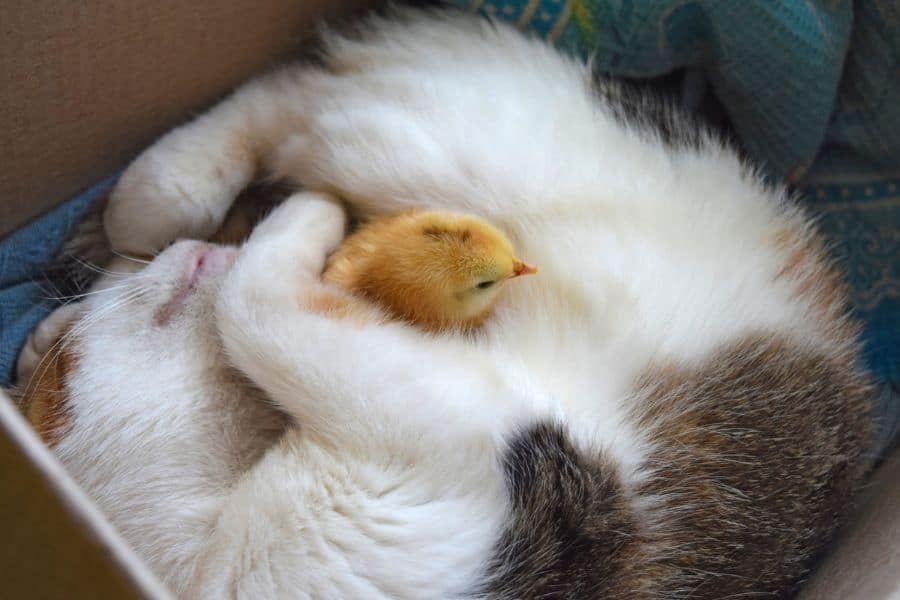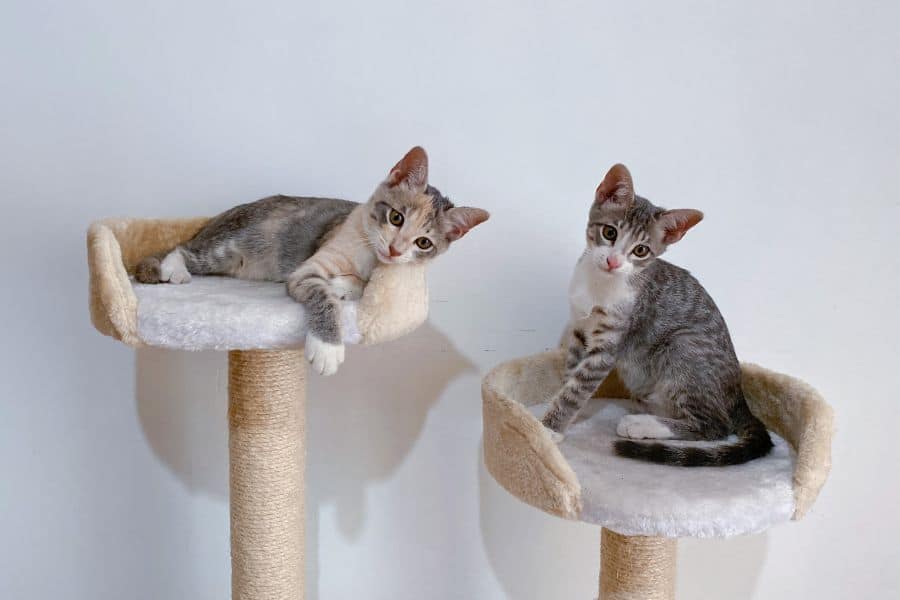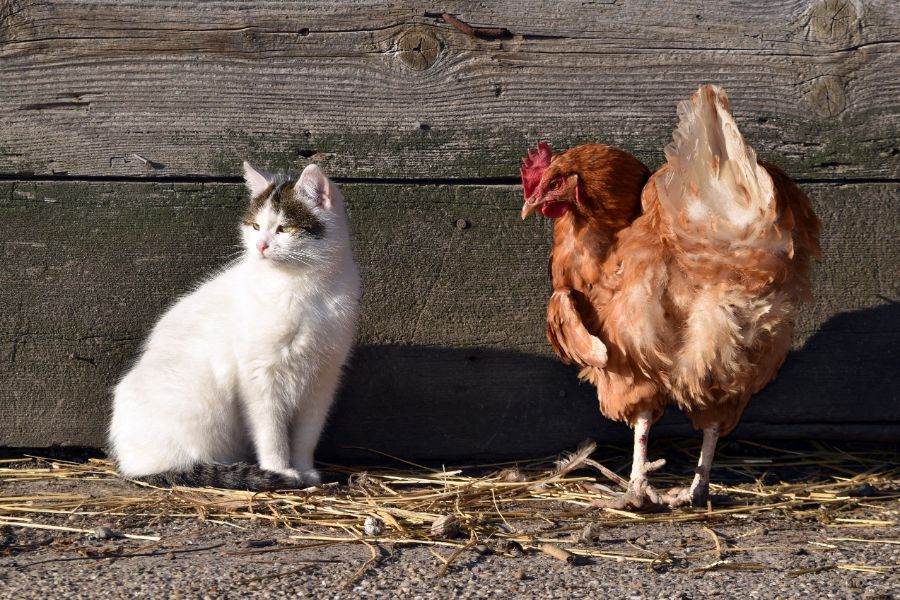Having a flock of chickens can naturally make you worry about potential predators, since losing chickens can mean losing valuable resources and money, but have you ever wondered if your own housecat could possibly attack or kill your chickens?
In this article, we’ll be looking at different interactions between your cat and chickens, including whether the former can kill the latter.

Cats have the potential of attacking and killing chickens (especially young chicks and hens), however this is quite rare as cats are rather intelligent animals that can sense that adult chickens are well protected.
The type of cat is also important; house cats are least likely to attack/kill your chickens while stray/feral cats present the biggest danger.
Let’s first briefly take a look at the different types of cats, as these terms will be used repeatedly throughout this article.
What are the Different Types of Cats?
Since we’ll be using different terms to describe cats later in the article, it’s best if we take a minute to go over some basic terminology so that you don’t get lost later on.
Domestic/House Cats (Both Indoor and Outdoor)
Domestic/house cats include both indoor and outdoor cats. These cats are usually well-trained and are very comfortable around humans and other pets.
Although both are pets, indoor and outdoor cats differ in that the former spends the majority of their time at home, while the latter is allowed to spend most of their time outside among other potential outdoor, feral, and stray cats.
Both indoor and outdoor cats are quite clean and approachable in general compared to the other types.
Stray Cats
Stray cats are those that are either lost or have ran away from home, thus these cats are usually considered in between a domestic/house and a feral cat.
Since strays are relatively new to their surroundings and aren’t used to hunting, they usually look unkept and possibly thinner than other cats.
Strays can be either approachable or scared of strangers depending on their situation (i.e. when they’ve been left on their own) and personality.
Feral Cats
Feral cats are cats that have spent their entire lives in the wild, hence they are adept hunters and aren’t afraid to tackle animals of similar, or even larger, sizes to themselves.
Similar to house cats, feral cats are also quite clean, as they’re used to living on their own and will clean themselves on a regular basis. Compared to the other cat types, feral cats often have calloused and hard paw pads due to them having spent almost all of their lives walking outside.
Feral cats are more likely to run away from humans then to approach the latter, and might even act aggressively if they feel cornered.
Overall, there are several ways of distinguishing these cats, so keep this in mind as you read through the article.
Interactions Between Cats and Chickens
Although it may seem like a strange pair, cats and chickens can indeed learn to live in harmony, if given proper time, training, and patience.
However, if you’re not careful, you might just find yourself in the middle of a confrontation between your cat(s) and chicken(s), including the former attacking and potentially killing the latter.
Do Cats Eat Chickens?
A big reason why cats are often not considered a major predator for chickens is because cats rarely eat chickens. This is especially true if you have house/domesticated cats and adult chickens under one roof.
Feral/stray cats on the other hand, are much more likely to eat your chickens, regardless of their size, since they’ve been adapted to become skilled hunters and tend to be hungry much of the time.
Of all the types of cats, feral and stray cats are the ones you’ll have to watch out for the most when it comes to protecting your chickens/chicks.
Do Cats Kill Chickens?
Cats are typically not known to kill adult chickens, as they’re often smart enough to realize that the adult chickens are too large and very capable of defending themselves using various body parts (i.e. beaks, spurs, and nails).
They are, however, willing to kill baby chicks and younger chickens as cats oftentimes find the latter to be delicious bite-sized snacks in between meals. Dedicated hunters may even stalk adult hens of smaller bantam chicken breeds if given the chance.
When it comes to adult chickens, domesticated (house and outdoor) cats are unlikely to kill them unless they have no other option, however feral and stray cats oftentimes are much more willing to do so since they’re not as tame and are much more physically capable.
If you notice any feral/stray cats stalking your chickens, you’ll have to take proper precautions to ensure your chickens’ safety.
Will Outdoor Cats Kill Chickens?
There is a risk of outdoor cats attacking chickens, but this is a relatively rare case as they may be quite timid in front of such large prey. Of course, it can nonetheless happen if the cats are too hungry, or see the chickens as easy prey if the latter are small.
Besides their size, adult chickens are also equipped with various defense mechanisms, such as their beaks and claws, which can significantly injure cats that are unaware of such dangers.
And since outdoor cats are simply house cats that are allowed outside by their owners, the cats are used to being pampered at home and thus are most likely unaware of the dangers that adult chickens can pose.
How Can You Protect Your Chickens from Cats?
Although cats (especially house and even stray cats) are rarely an issue for your chickens, you probably won’t want to risk leaving your chickens vulnerable out in the open. Here are some extra precautions you can take to ensure no harm comes to your chickens:
Keep Your Chickens in a Closed Off Enclosure
Arguably the best way of keeping your chickens safe is to place them within some type of closed off enclosure that the cats can’t reach.
The fencing around the enclosure should be covered in mesh or some other type of secure wiring so that try as they might, the cats won’t be able to break through.
Depending on how trusting you are of your cats, you may choose to place your smaller chicks in the enclosure first and wait until their mature enough before letting them out.
However, if you have stray or feral cats around, or you believe your house cats also pose a danger, you may choose to keep all your chicks and chickens permanently in the enclosure.
If your coop is not entirely closed off, its recommended that you make sure the fences reach at least 6 feet in height and also extends into the ground.
Because cats may sometimes use tunnels dug by other animals to reach inside the coop, keeping the fencing into the ground can prevent any potential access this way.
Keeping a Rooster Around
Of all the chickens that your cat(s) might face, a rooster’s the last one they’ll want to see. An adult rooster not only has all the basic defense mechanisms of a typical chicken, but it’ll also be quite a big larger and more muscular.
The main issue with having one is of course whether your city will allow it. Many suburbs permit keeping chickens around, but a rooster might be another story.
Using a Fake Predator
Cats are curious yet cautious animals by nature, hence setting up a decoy predator (i.e. an owl or coyote) can potentially drive a cat away from your chicken coop.
Cats are known to keep their distance from anything new in their environment, so this strategy should be able to deter them for some time.
Cats are smart however, hence the decoys should be moved around or switched occasionally as to not arouse suspicion that it’s a fake.
Using a Motion-Sensor Sprinkler
A motion-sensor sprinkler should help put your mind at ease since these are activated only when it detects movement.
This means that not only will it send a strong message to your chickens to not approach your chickens again, but it’ll also go the extra mile and protect you from other wild predators as well.
There are other ways of protecting your chickens from cats, however they can be a bit more extreme. These methods should be able to do the trick 99% of the time.
Read More:
Conclusion
Cats certainly have the capability of attacking and killing chickens, however the chances of such an occurrence is extremely low.
As long as you’ve taken the proper precautions, such as the ones mentioned in this article, you should have a safe coop of chickens for the foreseeable future.



